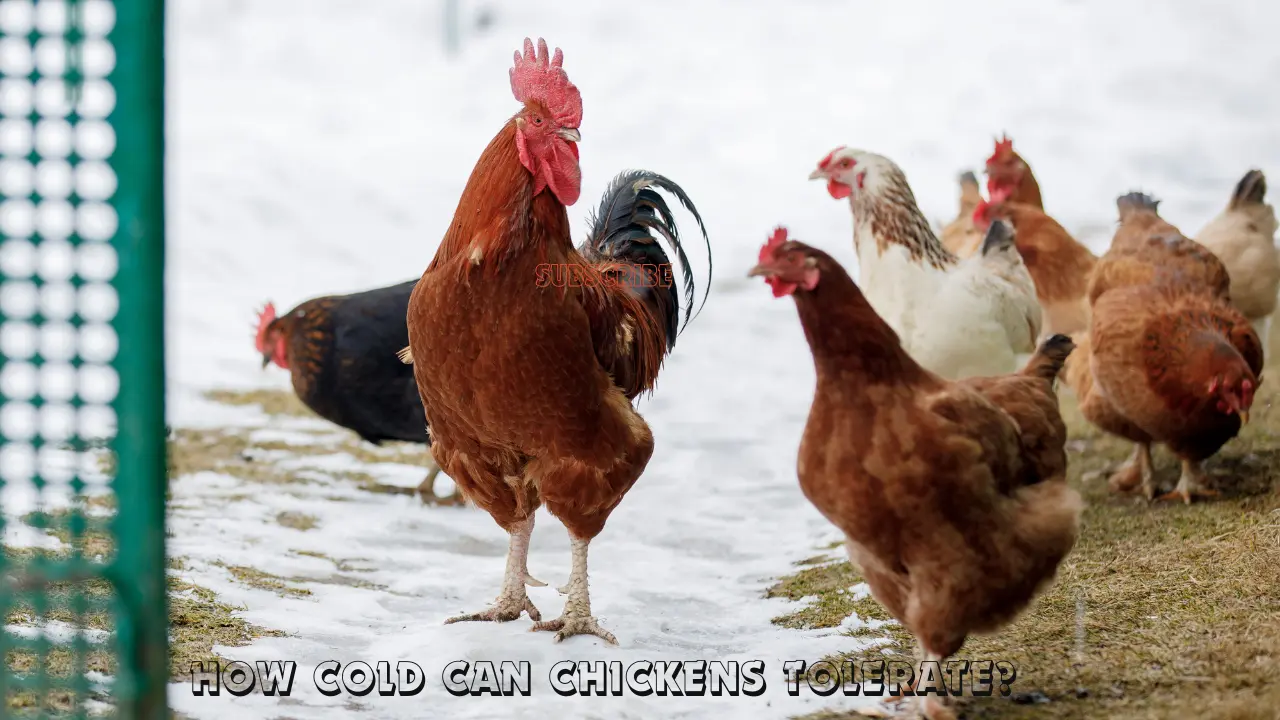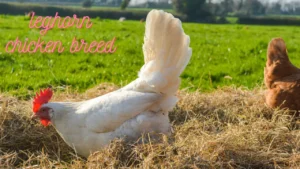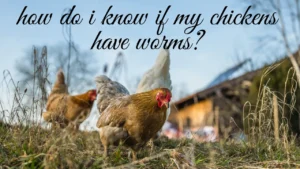When winter arrives, backyard chickens are usually tough enough to handle the chill, especially after molting. These hardy birds are surprisingly resilient but they can become susceptible to extreme cold temperatures without proper care. The cold may not be a concern for chickens in mild climates but in places where temperatures plummet, you need to prepare your flock. The right care is key to ensuring your feathery friends stay safe and comfortable especially when it gets too cold for comfort. With knowledge and the right additions to your coop, your chickens can thrive even during the harshest winters.
However, it’s important to note that even though chickens can survive in cold temperatures they do need extra attention. Experts suggest that chickens can tolerate temperatures as low as minus 20 degrees Fahrenheit but it depends on their environment. For instance, wide-open coops and feeding and watering outdoors can make things difficult. If you’re worried about the cold, tips for dealing with cold snaps are essential to prevent your flock from getting sick or freezing. Insulated coops and avoiding constant use of heat lamps can keep the coop at a manageable temperature without stressing your birds.
How Cold Can Chickens Tolerate? Is It Too Cold for Them?
Chickens are fairly hardy birds, but knowing how cold they can tolerate depends on a few factors, including their breed, age, and overall health. Some chicken breeds are more resilient to low temperatures than others. For example, Rhode Island Reds and Barred Plymouth Rocks can withstand colder temperatures better than more delicate breeds. In general chickens can handle temperatures as low as 0°F (-18°C) if they are healthy, well-fed and properly acclimated to cold weather. Their fresh feathers also help them stay warm in harsh conditions.
However, exposure to prolonged cold below -20°F (-29°C) can be dangerous, especially without adequate shelter and protection from the wind and moisture. Chickens need a draft-free shelter to stay comfortable in subzero temperatures. While most chickens are comfortable in 40-45 degrees Fahrenheit anything below that can cause stress and discomfort and can even lead to cold stress.
If chickens cannot produce enough body heat to balance the environmental temperature they may begin to show signs of discomfort, such as huddling puffing their feathers, or even holding a foot up to their breast. It’s important to monitor these signs closely to avoid any performance reduction or, in extreme cases death.
Elements Affecting Chickens’ Ability to Tolerate Cold
When it comes to how much cold chickens can tolerate, several factors come into play. The breed makeup of your birds can influence how well they manage low temperatures, as some breeds are more suited for cold weather than others. Additionally having adequate housing, proper bedding and a healthy diet are all essential for helping your chickens stay comfortable and healthy in cold conditions. Without these, it’s harder for them to maintain warmth and thrive during winter months.
Breed
Different chickens have varying levels of adaptability to cold climates. For instance, some breeds with smaller combs and wattles are less likely to experience frostbite making them better suited for diverse conditions. Experience with harsh weather can also influence how well they handle the cold.
Cold-tolerant chicken breeds include:
- Rhode Island Red
- Plymouth Rock
- Australorp
- Wyandotte
- Orpington
- Chantecler
- New Hampshire Red
- Jersey Giant
- Sussex
- Brahma
Shelter
A well-insulated, draft-free and well-ventilated chicken coop is vital to ensure that chickens stay comfortable. The coop should provide a dry wind-protected environment to help the chickens stay warm in cold weather. This setup is essential for maintaining their health and comfort.
Bedding
A coop needs proper bedding to keep chickens comfortable in cold weather. I’ve found that using straw and pine shavings helps a lot, as they act like natural insulation. These materials create a thick layer on the floor helping to insulate against the cold and trapping heat for extra warmth.
During freezing nights, I always make sure the bedding is deep enough to prevent the cold from seeping in. Pine shavings absorb moisture well, while straw provides a cozy, dry surface for the flock. The right bedding can make a huge difference in how well chickens handle the cold.
Diet
Keeping chickens warm in extreme cold starts with the right feed. A diet rich in protein and extra calories helps them produce more body heat to stay comfortable. During winter, I always check their water supply several times a day to ensure it’s not frozen, as access to clean, fresh water is just as important as food. Their source of nutrition must be steady, and feeding them daily with high-energy options supports their ability to handle the cold.
Roosts
To stay warm, chickens need sturdy roosting bars where they can huddle together and share body heat. This keeps their feet off the cold ground reducing the risk of frozen feet. Without proper roosts keeping them safe in winter becomes a challenge as exposure to cold can be dangerous.
How to Keep Chickens Warm in the Winter
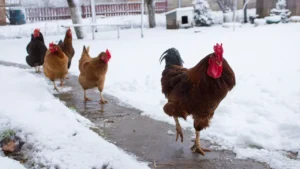
Here are my best tips to keep your chickens warm and healthy throughout the winter!
1. Proper Airflow is Essential
A coop needs proper ventilation to keep chickens safe from cold air without trapping moisture inside. While an insulated structure helps too much sealing can cause stagnant air, leading to ammonia buildup which is harmful to their health. Regularly inspecting for holes and cracks then sealing unwanted gaps while leaving enough openings at the top, ensures fresh air flows while keeping warmth inside.
2. Control Moisture Levels
Excess moisture buildup during winter increases the risk of frostbite, especially in poorly ventilated coops. Regularly check all surfaces inside the coop and focus on cleaning any manure to prevent damp conditions. Improving ventilation and increasing airflow can help address these issues ASAP before they become serious.
3. Prevent Frostbite in Chickens
Cold weather can be tough on chickens especially when temperatures drop to freezing levels. One of the biggest risks they face is frostbite which often affects toes, combs and other unprotected areas. To keep them safe, it’s crucial to have a well-ventilated coop that allows moisture to escape while keeping warmth inside. Damp air increases the risk of frostbite, so make sure the bedding stays dry.
Applying a thin layer of coconut oil, Vaseline, or protective jellies on exposed skin can help reduce the chances of damage when the cold is severe. If you notice any wounds from the cold, take immediate action to prevent infections. Keeping a close eye on their condition and ensuring they have a warm, dry space can make all the difference during harsh winter months.
4. Use a Wide Roosting Bar for Better Protection
When temperatures drop, it’s important to replace round perches with flat roosting bars, ideally 2x4s, so chickens can fully cover their toes with their warm feathers while they sleep. This helps them retain heat and reduces the risk of frostbite. To keep them comfortable, avoid materials like metal and plastic, as these can absorb the cold and cause discomfort or injury. A well-chosen roosting setup makes a big difference in keeping chickens safe during harsh winters.
5. Comparing Large and Small Flocks
Large flocks naturally huddle together at night to stay warm, using their body heat to fight off the cold. However, smaller groups may need extra protection especially in drafty coops where cold air seeps in. One effective solution is to wrap the coop in plastic, but it’s important to leave adequate ventilation at the top to prevent moisture buildup. A properly sealed yet breathable space helps chickens stay comfortable through winter.
6. Maintain a Dry Environment
A dry coop is essential for keeping chickens warm in winter, as damp conditions can make them colder. The deep litter method is a great way to trap heat while using natural decomposition for warmth. Adding Coop Recuperate which contains organic DE, lemongrass and eucalyptus oils helps maintain a clean, fresh space while reducing odors. A well-maintained environment keeps the flock comfortable all season long.
7. Fresh Water
When the temperature drops, it’s crucial to ensure that chickens have access to water that won’t freeze. Using heated plastic waters, especially ones that are covered helps prevent spills and accidents. Make sure the electrical source is free from dust and shavings to avoid a fire hazard. My favorite waterer is an electric nipple system which I’ve used for years. I’ve also tried dog bowls in the past, but they require daily cleaning due to dirt buildup, so I wouldn’t recommend that option.
Should You Use a Heat Lamp for Chickens?
Many people wonder whether chickens need a heat lamp in the winter months to stay warm. The short answer is no chickens are hardy and can handle cold temperatures if they have the right care. While a heat lamp may seem like a good way to supplement warmth, it is not essential and can actually be dangerous if not used correctly. A fire hazard is a real concern, as an extreme heat source can cause injury if chickens come in direct contact with it. Instead, focus on ways to provide a safe and adequate environment that naturally keeps them warm.
A well-prepared coop with proper bedding an enclosed shelter and protection from wind and tough weather conditions is far better than relying on artificial heat. In dangerously low temperatures, like -50 with chills in Minnesota, a well-placed heat source may be necessary. A caged heating panel is the best option since it’s designed to be positioned safely, preventing chickens from getting too close. Always do your research and find a safe heating form that won’t catch fire or put your flock at risk.
Keep These Health Factors in Mind
Protect Against Frostbite
To protect chickens from frostbite always watch for signs on their combs, wattles and feet. Frostbite is more likely to occur when there’s prolonged exposure to cold and moisture. The best way to prevent it is by keeping their coop dry and warm.
Managing Stress
When chickens are exposed to cold for long periods, it can cause stress, weakening their immune systems and making them more susceptible to illness. It’s important to watch for signs of sickness in your flock. Providing proper shelter and warmth will help reduce the effects of cold stress and keep your chickens healthy.
Winter Supplements for Chickens
In the winter, when weather patterns can fluctuate, it’s important to give your chickens the right supplements to keep them healthy. I use Flock Fixer in their water to support their digestive and immune systems. It contains necessary vitamins, minerals and organic oregano oil to help boost their health. I also give them Chicken E-lixir as a daily vitamin to keep them strong and reduce stress.
Along with this, make sure they get a balanced feed, which includes scratch, cracked corn, and other treats like Happy Tract or Golden Graze. These will keep their bodies working efficiently to stay warm. This combination of supplements has saved my chickens’ lives during the harsh Minnesota winters and I highly recommend them for anyone looking to keep their flock fine during the cold months.
Daily Essentials from Backyard Boost
When keeping chickens healthy during the cold months, Daily Essentials from Backyard Boost can make a big difference. This product contains AO-Biotics®, including Amaferm®, which is a prebiotic that has been research-proven to enhance digestibility. It also includes EQE, a postbiotic that improves egg quality. These ingredients provide the nutrients needed for overall well-being, supporting the digestive system of your chickens and keeping them healthier and better-fed.
Along with these, making sure your chickens have access to fresh water every morning and evening is essential. Ice can form, so consider an electric heated waterer to keep their water from freezing. By maintaining a healthy diet and providing the right nutrition your flock will thrive during the colder months helping them stay strong and healthy year-round.
Benefits of Backyard Boost
Backyard Boost is a set of specially crafted products designed to support the well-being of your birds. These products help keep your hens warm during the coldest months of the year and continue to support them year-round. The added protein in Daily Essentials, along with Amaferm and AO-Biotics EQE, keeps your hens healthy and performing well. Happy hens are always healthy hens, and happy hens lead to happy hen owners!
Are the Temperatures Too Cold for Chickens?
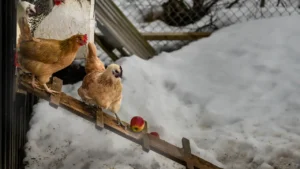
As Old Man Winter arrives, time seems to fly and the extreme cold can cause serious damage to your flock if you’re not prepared. It’s crucial to keep your backyard birds protected from the cold by taking proactive measures. Before the temperatures drop make sure their living space is dry, comfortable and has proper ventilation. With the right nutrition and care, your chickens will thrive even in the winter.
Boost Your Backyard Today!
To help your chickens stay healthy and strong during the cold winter months, you need to prep with the right products. Backyard Boost Daily Essentials provide the necessary protein to keep your flock performing at its best no matter the temperature or weather. Ordering is simple you can purchase online through the store or retail partners or if you prefer use the Where to Buy tool to find the closest retailer. These industry-leading supplements will help keep your backyard chickens thriving year-round.
FAQs
1. What temperature is too cold for chickens?
Chickens can tolerate temperatures as low as 20°F (-6°C), but anything below that may cause stress or frostbite, especially if they are exposed for long periods.
2. Can chickens survive in freezing weather?
Yes, chickens can survive freezing weather if they have proper shelter, warmth and protection from wind and moisture.
3. How can I keep my chickens warm in winter?
To keep chickens warm, ensure they have a well-ventilated, dry coop add bedding for insulation and offer them warm food and fresh water.
4. Do I need a heat lamp for my chickens in winter?
A heat lamp is not necessary for most chickens, but if temperatures drop extremely low, a safe heat source can help prevent frostbite.
5. How do chickens protect themselves from the cold?
Chickens naturally fluff up their feathers to trap heat, and they huddle together to stay warm when the temperature drops.
Conclusion
Understanding how cold chickens can tolerate is crucial for ensuring their health and well-being during the colder months. Chickens are hardy creatures and can handle cold temperatures as low as 20°F (-6°C), but prolonged exposure to extreme cold can cause stress, frostbite and even illness. Providing a safe, dry and well-insulated coop, along with proper nutrition and fresh water is essential for keeping your flock comfortable throughout winter. By following these simple steps you can protect your chickens from the harsh effects of cold weather.
While heat lamps are not always necessary, ensuring your chickens have access to proper shelter and protection from the wind and cold will keep them happy and healthy. Backyard Boost products can be a great addition to your winter care routine helping to boost your chickens’ health and performance. By taking proactive measures, you’ll help your chickens thrive no matter how cold it gets.
